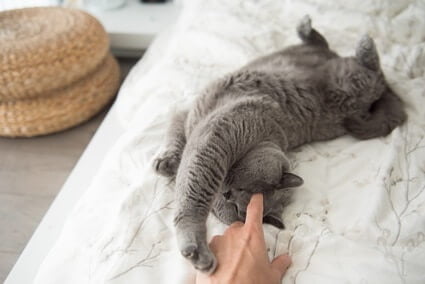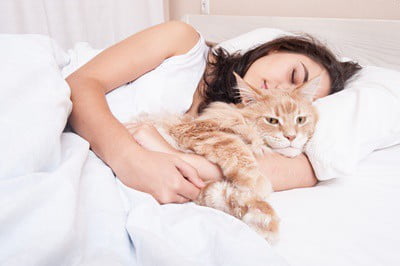As long as people have had cats, they have debated the sleeping arrangements. Some owners firmly refuse to allow their cat into the bedroom at night, while others draw comfort from keeping a cat nearby at bedtime. There are clear pros and cons to sleeping next to your cat that must be carefully considered.
Sleeping close to cats reduces stress and anxiety. The close proximity of a cat can also provide security, and sleeping in the same bed will strengthen the feline-human bond. Unfortunately, cats can be more active at night and may tread litter and waste into your bed linen. You must also be careful not to crush your cat during your sleep. Sleeping next to your cat also makes your bed its territory, so you’ll never have any privacy again.
Whether you allow a cat onto your bed is a personal choice, so explore the advantages and disadvantages before proceeding. A cat that sleeps with you will expect to maintain this routine in the future.
Why Cats Should Sleep in Your Bed
If your cat wants to sleep with you, do not dismiss the idea out of hand. Having your cat nearby to keep you company is beneficial in several ways. Let’s explore the positives:
Aid to Falling Asleep
There is no denying that cats can sometimes prevent you from falling asleep. However, Mayo Clinic Proceedings found that 41% of people found it easier to fall asleep with animal companionship.
A cat will provide warmth, which will be comforting. Cats run a higher body temperature than humans, at roughly 100 degrees Fahrenheit. This means that sleeping with a feline is akin to having a hot water bottle.
The rhythmic breathing and purring of a cat will provide comfort. Whether you are conscious of this or not, the sound will soothe you into sleep. You will find that your breathing rate falls in line with that of your cat and that you’ll soon drift off together.
Stress Relief
Feline ownership has long been linked to reductions in stress and anxiety. As per The Journal of Vascular and Interventional Neurology, owners are less likely to experience cardiovascular disease.
If you sleep with your cat, you will remain calm, and your blood pressure will be lower. If you spend time in bed aside from sleeping, watching television, or reading, this arrangement will be especially beneficial.
This can be important for anybody prone to night terrors. Having a cat nearby will keep the heart rate low and reduce the likelihood of nightmares. This can be good for those with post-traumatic stress disorder or similar issues.
Spending time with a cat also releases oxytocin, aka “the love hormone.” Consider oxytocin to be the antithesis of cortisol, the so-called “stress hormone.” Your brain will be flooded with positive sensations when you need them most.
Security
Cats have excellent senses and retain a constant state of awareness. Even when sleeping, a cat will quickly leap into action when necessary. This can add an extra layer of security, especially if you live alone.
A cat’s superior sense of hearing will pick up on strange noises. Your cat will hear untoward sounds, such as somebody attempting to gain entry to your home. However, your cat’s super hearing could become an issue if it is nervous as it will react to every noise outside your bedroom window.
Cats can see better in poor lighting than humans. Cats need some degree of light to see in pitch darkness better than humans. Crack the blinds to allow limited illumination from streetlamps, and your cat will see clearly.
A cat’s sense of smell may also add security overnight. Cats will detect strange aromas, such as gas leaks. In the event of something untoward, the cat may wake you up. The same applies to potential life-endangering hazards, such as fire.
It can be annoying when a cat wakes you up to announce something overnight. On the other hand, it may make you feel safer. Sleeping with a cat means nothing that happens in your home after dark will go unnoticed.

Bonding
Sleeping with a cat will improve the bond between you. A cat will not consider sleeping on your bed unless it trusts you implicitly. Cats are rarely more vulnerable than when dozing. If you prove yourself worthy of this trust, your bond will be significantly enhanced.
Gaining the trust of a cat can take time. The more time you spend together, the faster the bond will occur. This makes sleeping together a fast track to building this special relationship.
While your cat is asleep, resist the urge to pet it. Let your cat catch up on undisturbed sleep. If you do so, your cat will consider you a source of pleasure and safety. Never cuddle up to a cat in bed as they loathe feeling restrained.
You’ll know when you have bonded with your cat as it will leap onto your bed when you retire for the night. Your cat has grown to consider co-sleeping its arrangement of choice.
Why Cats Should Not Sleep in Your Bed
Sharing your bed with a cat will not work for everybody. Let’s explore the negatives before you commit to this sleeping arrangement.
Disturbed Sleep
Some cats are crepuscular, so they are most active during dawn and dusk hours. However, many cats prefer to keep nocturnal hours. At night, when humans are sound asleep, cats can go about their business undisturbed.
This is not necessarily a problem if you do not sleep with your cat. If you’re a sound sleeper, you’ll not notice any of their escapades. A cat in the bedroom is different as it will run, jump, and verbalize throughout the night. If the cat wants attention, it will not hesitate to demand this from you.
Set a routine that helps your cat sleep through the night. About an hour before you go to bed, play with your cat and give it dinner. With a full stomach and sated play instinct, your cat will be ready to groom itself and go to sleep.
You still risk sporadically interrupted sleep. Your cat may wake up in the night. If you sleep with the door closed, the cat will scratch and meow. It is announcing its desire for food or to use the litter box. You could keep these items in the bedroom, but there’s an obvious hygiene concern.
Physical Safety
Sleeping with a cat on your bed comes with certain safety risks that must be managed. These physical hazards apply to both you and your cat.
You are larger and heavier than your pet. If you roll over in your sleep, you risk crushing your cat. Most felines are nimble enough to get out of the way, but they may not notice your movement if they’re fast asleep. Ensure that you allow enough space to keep the cat safe.
Avoid stationing your cat on a spare pillow. This will protect the cat from your body, but it places you at risk. Trends in Neurosciences confirm that cats display oneiric behaviors during sleep. The cat will flail and gesticulate in its sleep.
The safest place for a cat to sleep on your bed is by your feet. Just be aware that the cat will likely move as cats prefer to sleep near your face.

Unsanitary Linens
If your cat sleeps on your bed, it will drag the contents of its paws onto your linens. That doesn’t just mean muddy paw prints. Your cat will also bring traces of used litter onto the bedsheets.
Depending on how clean your cat is, you may also be left with urine or fecal stains. Feline waste can carry a range of zoonotic diseases and infections. Close proximity to an area in which you breathe deeply is hazardous to your health.
You should also factor shedding into consideration. Your cat will be releasing all kinds of dander overnight and coating your bedsheets with fur. A bedroom is likely to be a comparatively enclosed space, meaning that an allergic reaction is likelier than in open areas.
Territoriality
If your cat sleeps on your bed, your bed comes feline territory. This means that you will never sleep alone again.
In some respects, a cat considering your bed its territory is no bad thing. The Journal of the American Veterinary Medical Association explains how cats with separation anxiety often soil an owner’s bed. This is less likely if the cat considers the bed to be its own property.
You may be happy for the cat to consider your bed its own. Why would you not want the cat to feel welcome? A key factor here is any partner that shares your bed. Once your bed is established as feline territory, there is no going back. If you share a bed with somebody that has a cat allergy, this could cause a problem.
Always take all of the pros and cons into consideration before co-sleeping with a cat. You cannot change your mind or only allow the cat onto the bed on certain nights. Felines do not understand nuance. Your cat will sleep on the bed, or it will not. There is no middle ground.


so what do you do if you dont want the cat on your bed if you close your door they meow all night?